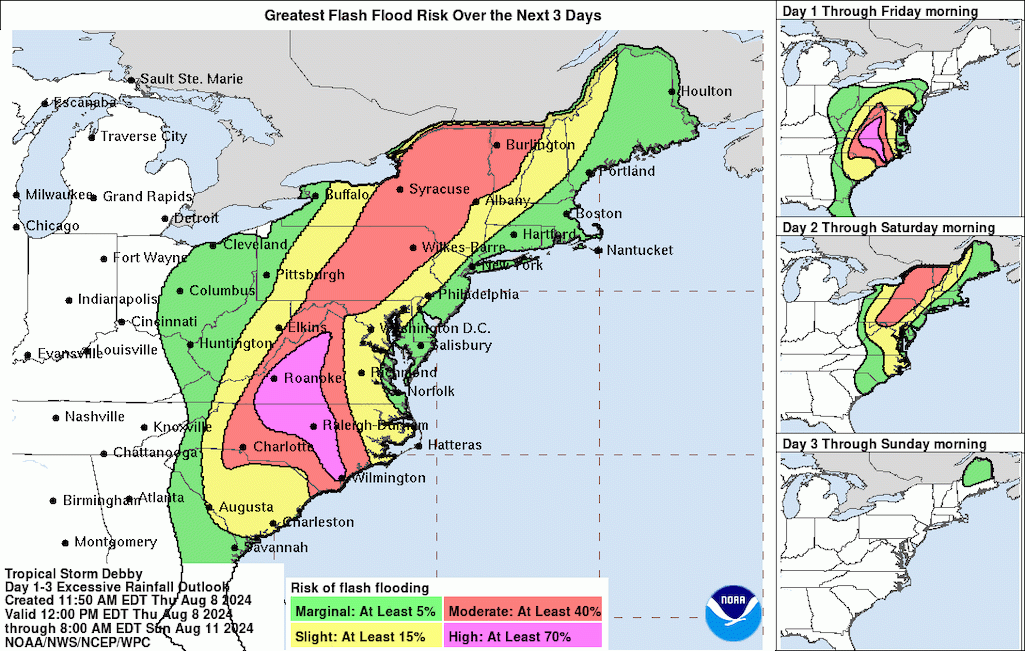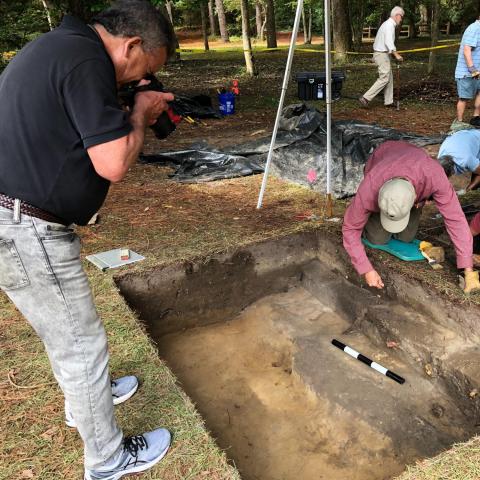Tropical Storm Debby was carrying heavy rains across the Carolinas and the Virginias on Thursday, with heavy seas along the Outer Banks of North Carolina that spurred a water quality alert due to a leaking wastewater system at Cape Hatteras National Seashore.
The North Carolina Department of Environmental Quality, which hadn't yet confirmed dangerous bacteria levels in coastal waters, nevertheless advised seashore visitors to avoid going into the ocean until testing confirmed that bacteria levels were within the state's and U.S. Enviromental Protection Agency's standards.
“Severe weather events like tropical storms and hurricanes bring excessive amounts of rain, storm surge and cause extreme flooding. These conditions increase levels of harmful bacteria in our coastal waters that can cause illness,” said Erin Bryan-Millush, manager of the N.C. Recreational Water Quality Program. “The sources of bacteria can vary and include failing septic systems, sewer line breaks and overflowing manholes.”
At Cape Hatteras, spokesman Michael Barber said staff "is aware of one compromised residential wastewater system on the beach at the north end of Rodanthe, near Corbina Drive. A precautionary advisory sign has also been posted at this location. Consistent with the Seashore's August 7 news release, visitors to Rodanthe should avoid the beach between the north end of Rodanthe and South Shore Drive until conditions improve.
"Additionally, the seashore reminds its visitors that dangerous rip currents are forecast to be a threat through this weekend," added Barber. "The seashore's lifeguards, the Hatteras Island Rescue Squad and Chicamacomico Banks Water Rescue, are all trusted sources of in-person information on our beaches. Visitors should follow the helpful advice of these life-saving professionals."

Tropical Storm Debby was carrying flash flooding risks north through the Eastern Seaboard/NOAA
At Shenandoah National Park in Virginia, staff was urging visitors to keep an eye on the weather.
"Be cautious of potential downed trees, downed power lines, and lightning. Expect power outages," the park said in its social media channels. "Even though the rain is much needed, potential hazards may develop due to heavy rain and flooding. Flood watches remain in effect tonight and tomorrow in the park and surrounding areas. Avoid stream crossings when possible. Plan on turning around, waiting it out, or going elsewhere if water is too high, cold, or swift."
Elsewhere in Virginia, Richmond National Battlefield Park closed its visitor centers for Thursday and Friday "due to the threat posed by rains and high wind from Tropical Storm Debby," while the entire Maggie L. Walker National Historic Site was closed those days due to the storm.
Fort Pulaski National Monument in Georgia, which had closed August 5 in advance of the storm, reopened at noon Thursday after staff "completed an assessment of the park’s facilities and resources on Wednesday and found little damage."
With the tropical storm expected to carry the risk of flash floods and strong, gusting winds into the weekend as it moves northward towards New England, other park closures could arise.



 Support Essential Coverage of Essential Places
Support Essential Coverage of Essential Places






